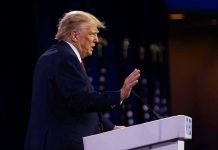
A Harlem pastor’s critique of Zohran Mamdani’s Ugandan roots intensifies debates over authenticity in NYC’s mayoral race.
Story Highlights
- James Kilgore, supporting Eric Adams, questions Zohran Mamdani’s authenticity.
- Mamdani’s upbringing in Uganda is highlighted as a political attack.
- Adams seeks support from Harlem clergy amid declining poll numbers.
- Clergy endorsements play a crucial role in shaping voter opinion.
Pastor’s Remarks Stir Debate
During an endorsement event for New York City Mayor Eric Adams’ reelection campaign on August 5, 2025, Harlem Pastor James Kilgore criticized Democratic Socialist candidate Zohran Mamdani for his privileged upbringing in Uganda. Kilgore mentioned Mamdani’s “lavish off-the-grid wedding” in Kampala, mispronouncing the neighborhood’s name. This incident was part of a broader effort by Adams’ supporters to question Mamdani’s authenticity and connection to New York’s working-class communities.
Kilgore’s comments came as Adams’ campaign trailed Mamdani and other rivals in polls, prompting intensified rhetoric to shore up support among faith communities. The use of Mamdani’s international background as a political attack highlights the intersection of identity politics, class, and authenticity in the mayoral race. Adams’ positioning as a product of New York’s working-class neighborhoods is contrasted with Mamdani’s upbringing in Uganda.
Faith Leaders’ Influence in Politics
Religious leaders, particularly in Harlem, wield significant influence over local voters, especially among Black and faith-based communities. The endorsement from dozens of clergy, including Kilgore, is a strategic move by Adams to reinforce his image as aligned with faith-based values. This support is crucial as Adams faces corruption allegations and declining credibility. The backing of faith leaders helps counteract negative press and bolster his campaign.
Adams has previously emphasized his ties to faith communities as a cornerstone of his campaign. However, Mamdani’s campaign, gaining traction among younger and more progressive voters, challenges Adams’ appeal. The endorsement event underscores the importance of faith-based endorsements in NYC politics and highlights ongoing tensions between progressive and establishment factions within the Democratic Party.
Implications for the Mayoral Race
The remarks by Kilgore may energize Adams’ base and draw media attention to the race’s class and identity dynamics. Over time, persistent focus on candidates’ backgrounds could shape voter perceptions and influence turnout, particularly in communities sensitive to authenticity and representation. Progressive voters might view attacks on Mamdani’s background as xenophobic or classist, possibly affecting their support.
The incident reflects broader trends in American urban politics, where identity, class, and authenticity are increasingly central to campaign narratives. As the campaigns intensify, the role of authenticity and local ties will be pivotal in determining electoral success. Faith leaders’ endorsements remain a powerful force, especially in Harlem and similar neighborhoods, influencing the electoral landscape and shaping public opinion.
Sources:
AMNY: “NYC Mayor’s Race: ‘Man of God’ Eric Adams’ reelection …”
Harlem World Magazine: “100 Pastors Against NYC Council’s Proposed Ban On Real Fur …”
Solidarity Webzine: “The First Phase of the Mamdani Campaign”












